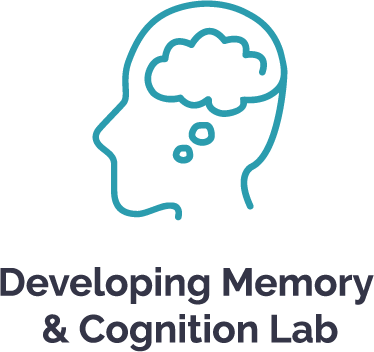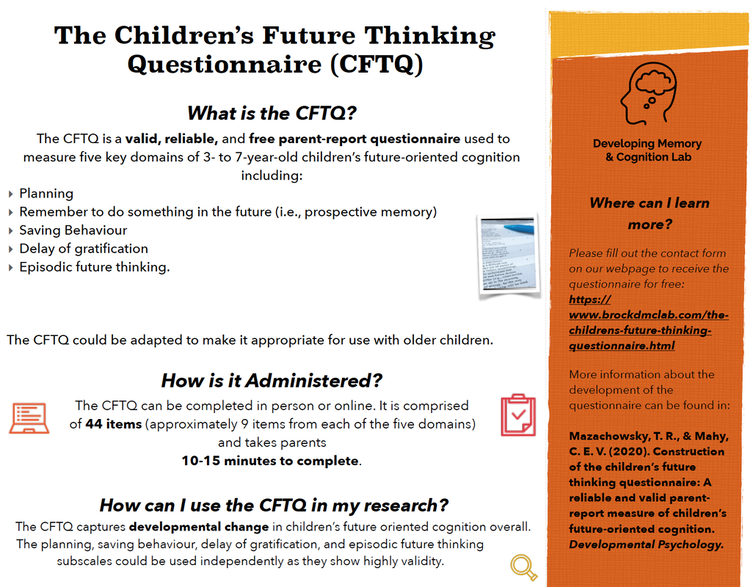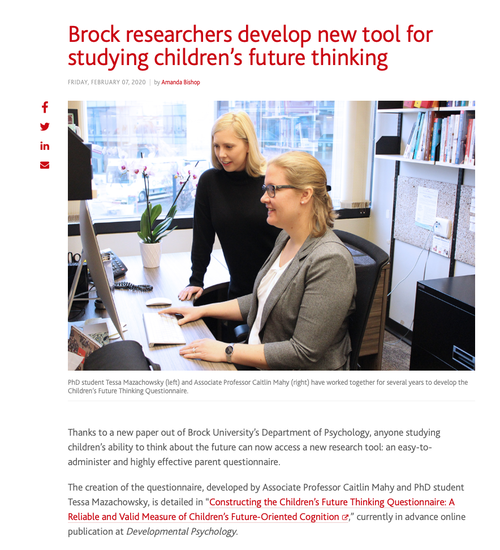The Children's Future Thinking Questionnaire (CFTQ)
Mazachowsky, T. R., & Mahy, C. E. V. (2020). Construction of the children’s future thinking questionnaire: A reliable and valid parent-report measure of children’s future-oriented cognition. Developmental Psychology, 56, 756-772. [PDF]
Our lab has developed a reliable and valid parent-questionnaire to measure 3- to 7-year-olds' future oriented cognition in the domains of planning, prospective memory, delay of gratification, saving, and episodic foresight. It is called the Children's Future Thinking Questionnaire (Mazachowsky & Mahy, 2020).
The Children's Future Thinking Questionnaire is 44-items and shows strong psychometric properties including strong internal consistency of the five subscales and full scale, excellent test-retest reliability, and good validity (parent's responses are correlated with children's behavioural performance on lab tasks). The questionnaire is meant to tap into children's future-oriented behaviour broadly and is an excellent addition to traditional laboratory behavioural measures of children's performance. You can read more about the reliability and validity of the CFTQ in our paper in Developmental Psychology. The paper contains 4 studies that describe the development, refinement, and testing of the psychometric properties of the CFTQ.
It takes parents 10 to 15 minutes to complete and can be administered in person or online.
The final questionnaire is freely available to researchers on this webpage. Please fill out the contact form at the bottom of the page if you are interested in using the questionnaire and it will be sent to you along with a scoring guide.
The CFTQ could be adapted for use with children older than 3- to 7-years-old. It was designed so that basic items could stay the same, but age-appropriate examples could be substituted for the current examples appropriate for young children.
The video below provides some important information and FAQ about the CFTQ.
It takes parents 10 to 15 minutes to complete and can be administered in person or online.
The final questionnaire is freely available to researchers on this webpage. Please fill out the contact form at the bottom of the page if you are interested in using the questionnaire and it will be sent to you along with a scoring guide.
The CFTQ could be adapted for use with children older than 3- to 7-years-old. It was designed so that basic items could stay the same, but age-appropriate examples could be substituted for the current examples appropriate for young children.
The video below provides some important information and FAQ about the CFTQ.
Here is an article about the Children's Future Thinking Questionnaire published in The Brock News:
Published studies that have used the Children's Future Thinking Questionnaire
Marks, J., Schneider, S., & Voigt, B. (2024). Interindividual differences in episodic foresight: The role of personality factors and family context in preschool-aged and primary-school-aged children. Learning and Individual Differences, 111, 102444.
Marks, J., Schneider, S., & Voigt, B. (2023). Future-Oriented Cognition: Links to Mental Health Problems and Mental Well-being in Preschool-aged and Primary-school-aged Children. Frontiers in Psychology, 14, 1211986.
Fuke, T. S.S., Kamber, E., Alunni, M., & Mahy, C. E. V. (2023). The emergence of procrastination in early childhood: Relations with executive control and future-oriented cognition. Developmental Psychology, 59, 579-593.
Kamber, E., Mazachowsky, T. R. & Mahy, C. E. V. (2022). The emergence of future-oriented cognition in toddlerhood: The contribution of cognitive and language abilities. Journal of Cognition and Development.
Sadeghi, S., Ayoubi, S., & Brand, S. (2022). Parenting Styles Predict Future-Oriented Cognition in Children: A Cross-Sectional Study. Children, 9(10), 1589.
Fuke, T. S., & Mahy, C. E. V. (2022). Executive and retrospective memory processes in preschoolers’ prospective memory development. Cognitive Development, 62, 101172.
Sadeghi, S., Ayoubi, S., & Sarlak, S. (2022). Psychometric Properties of the Children’s Future Thinking Questionnaire in Iranian Children. Quarterly Journal of Applied Psychology, 16(1), 46-31.
Marks, J., Schneider, S., & Voigt, B. (2023). Future-Oriented Cognition: Links to Mental Health Problems and Mental Well-being in Preschool-aged and Primary-school-aged Children. Frontiers in Psychology, 14, 1211986.
Fuke, T. S.S., Kamber, E., Alunni, M., & Mahy, C. E. V. (2023). The emergence of procrastination in early childhood: Relations with executive control and future-oriented cognition. Developmental Psychology, 59, 579-593.
Kamber, E., Mazachowsky, T. R. & Mahy, C. E. V. (2022). The emergence of future-oriented cognition in toddlerhood: The contribution of cognitive and language abilities. Journal of Cognition and Development.
Sadeghi, S., Ayoubi, S., & Brand, S. (2022). Parenting Styles Predict Future-Oriented Cognition in Children: A Cross-Sectional Study. Children, 9(10), 1589.
Fuke, T. S., & Mahy, C. E. V. (2022). Executive and retrospective memory processes in preschoolers’ prospective memory development. Cognitive Development, 62, 101172.
Sadeghi, S., Ayoubi, S., & Sarlak, S. (2022). Psychometric Properties of the Children’s Future Thinking Questionnaire in Iranian Children. Quarterly Journal of Applied Psychology, 16(1), 46-31.
Supplemental Files
(Mazachowsky & Mahy, 2020)
These files are being made available so that researchers can see how behavioural tasks were administered in Study 2 and 3 of our paper on the development of the Children's Future Thinking Questionnaire in Developmental Psychology.
Behavioural Task Script from Study 2
Behavioural Task Script from Study 3
(Mazachowsky & Mahy, 2020)
These files are being made available so that researchers can see how behavioural tasks were administered in Study 2 and 3 of our paper on the development of the Children's Future Thinking Questionnaire in Developmental Psychology.
Behavioural Task Script from Study 2
Behavioural Task Script from Study 3




